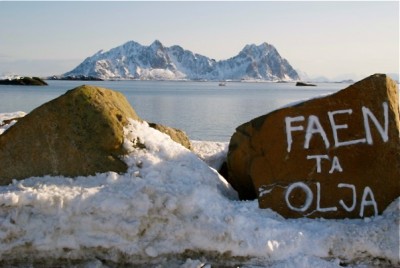The leader of Norway’s largest trade union federation, Fagforbundet, is challenging both its umbrella organization LO, the oil industry and the two parties leading Norway’s minority coalition by coming out in favour of protecting especially sensitive coastal areas off Lofoten, Vesterålen and Senja from oil exploration. The powerful union group’s leader Mette Nord is also calling for a reduction in oil and gas production on existing Norwegian fields, even though that can threaten jobs, claiming that meeting the goals set in Paris for carbon emission cuts is more important.

“If we’re going to take the Paris agreement seriously, we in fact have to do something here in Norway also,” Fagforbundet’s leader Mette Nord told newspaper VG. She was also a guest on state broadcaster NRK’s popular morning talk show Politisk kvarter on Tuesday, where she spoke out against more oil drilling and production.
Nord, who leads a group with more than 351,000 members, argued that Norway will never be able to significantly cut carbon emissions if it doesn’t scale back oil production. She thinks it’s wrong to open up new oil fields and especially to explore for new sources of oil and gas in the rich fishing grounds off Lofoten, a huge tourist magnet that could be threatened by oil and gas activity nearby.
“We have lasting protection of our waterways in Norway, and I think we must dare to have a debate over principles” involving protection of the environment and climate concerns at the federation’s next national meeting, Nord told VG. She noted on NRK Tuesday morning that Norway’s adherence to the landmark climate agreement in Paris has consequences for emissions within Norway as well as elsewhere around the world. It obligates Norway to cut its emissions by at least 40 percent by 2030, compared to 1990 levels, in order to limit global warming to 2 degrees. Norway’s emissions have instead continued to rise and that’s largely because of the country’s oil industry.

Nord’s comments have infuriated the oil industry, also many in Northern Norway who are more concerned about economic development than the climate. “This must be the ultimate example of ignoring history, if Fagforbundet doesn’t see the connection between the welfare state and income from the oil industry,” railed Kjell Giæver of the Northern Norwegian network PetroArctic.
Leif Sande, head of the Industri Energi union that represents offshore workers, was already promising a battle against Nord’s proposal, claiming that exploration and production off Lofoten was “important for jobs and income for Norway.” Her proposal also defies the position taken by the national trade confederation LO, of which Fagforbundet is a member. LO boss Gerd Kristiansen and the organization itself, which has strong ties to the Labour Party, has been promoting oil activity off Lofoten and more of it in the Barents and Norwegian seas and Skagerrak, in unusual agreement with the Conservative and Progress parties that make up Norway’s minority coalition government. They’ve been prevented from moving forward with plans to open up the seas off Lofoten to oil exploration, though, in order to secure support in Parliament from two parties that oppose it, the Liberals and Christian Democrats.
So inflammatory is the debate over more oil exploration off Norway that the Liberals’ leader Trine Skei Grande is staying away from a government banquet in early November that’s meant to celebrate 50 years of Norway’s oil industry. Even though oil has made Norway affluent, Grande sees no reason to celebrate it given the climate threat it represents.
Oil Minister Tord Lien, meanwhile, has been aggressively planning to open more portions of Norway’s offshore territory to oil exploration but even he has acknowledged recently that stronger global climate measures may speed up the closure of some fields. “The Paris agreement means we must prepare ourselves for stricter and more expensive climate measures,” he told news bureau NTB last week. “That will affect profitability of both the usage and production of energy.”
He claims Norway’s oil inustry is well-prepared for cutbacks, and said he can’t rule out that some fields may be closed earlier than expected. He added, though, that it will be “impossible” to cover the world’s energy needs without more use of fossil fuels in the near future.
newsinenglish.no/Nina Berglund

